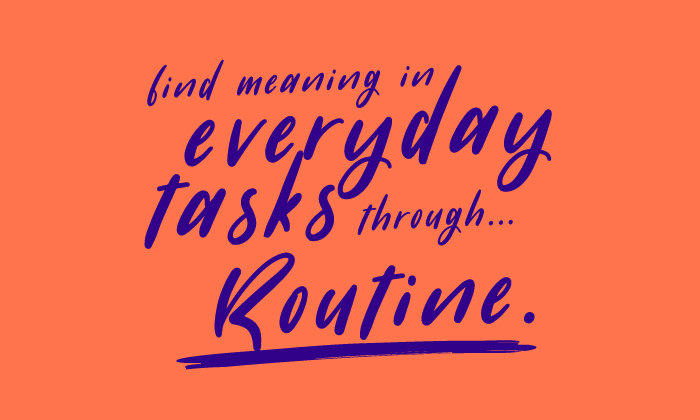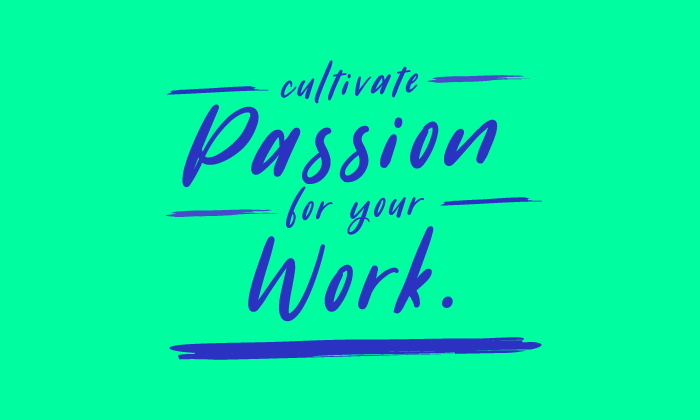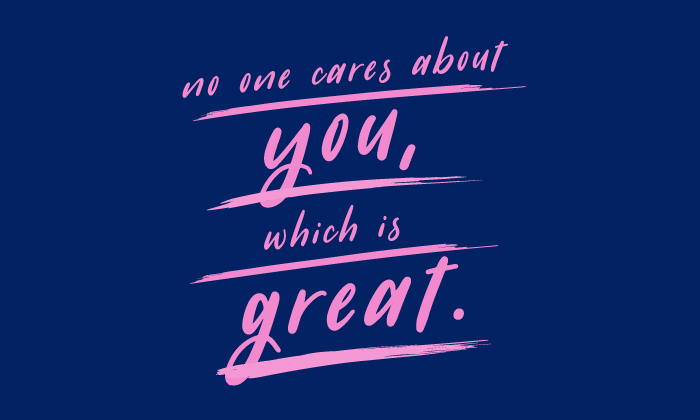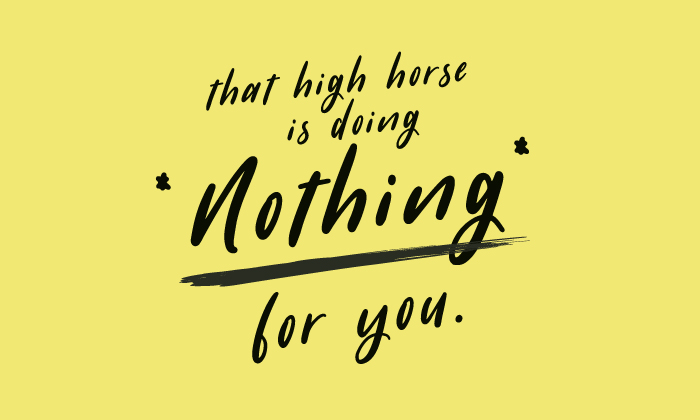Learn from these lessons
While we all have different opinions about the role of work in fulfilling our lives, we can’t deny its relevance in shaping our identity. We’re told from a young age that we must discover our passion or ‘dream job’ to be complete. Even if this is the case, which more often is not, the daily grind is inevitably monotonous, leading us to prematurely question our decisions or career path.
What’s not emphasised enough about our professional lives is the fact that we won’t always feel what we’re doing is meaningful, and should instead learn to find meaning by renewing our motivation and taking ownership of our jobs. Aside from the benefit of elevating our performance, what’s more important is its ability to transform our attitude for work and life. So, are you ready to make a change?
Click here to download the above artwork for desktop
Click here to download the above artwork for mobile
“No one is coming to save you. Are you going to save yourself?” – Jason Lengstorf
This may sound harsh, but no one actually cares about you – at least not your success. Not your boss, not your colleagues, not your friends. Okay, your parents do, but that’s about it. We lament our manager for not recognising our talent, or our co-workers for not cutting us some slack, but not only do they have zero obligation to do so, we become victims of our own naiveté for believing they should.
This may seem like a downer, but it’s actually a liberating concept rather than an isolating one. Think about it like this: no one cares about whether you succeed or whether you fail. No one will remember that mistake you made, the time you embarrassed yourself, or when you veered from the status quo. With that in mind, caring about what others think starts to seem rather pointless.
The moment we feel empowered by the autonomy of being accountable for our own actions is the moment we start living for ourselves, rather than waiting for someone else to.
See the difference between ‘fault’ and ‘responsibility’
“Fault looks back, and responsibility looks forward.” – Rick Ackerly
No one likes to take responsibility for something they’re not at fault for, that’s a given. But responsibility and fault take on different meanings in a professional environment, as you can easily be responsible for something going wrong even if you had nothing to do with it.
Aside from the obvious case of having to take responsibility for your team’s mistakes when you’re in a management position, the more common scenario is one where it’s difficult to identify who’s really at fault. For instance, if you fail to meet a deadline because a colleague asked you for help on something that should’ve taken an hour but ended up taking half the day.
Instead of fixating on who’s at fault, look at who’s responsible (in this case, you), take the necessary actions to rectify the situation, and move on. John Coleman notes in Harvard Business Review that “fault always looks back at who should be blamed, while responsibility looks forward at what can be done differently in the future,” enabling learning in the process.
Click here to download the above artwork for desktop
Click here to download the above artwork for mobile
“Focused. I’m a hustler. And my hustle is trying to figure out the best ways to do what I like without having to do much else.” – Mos Def
Our education system and professional sphere dictates that we must fit our skillsets and responsibilities into specific moulds, consequently separating what we ‘should’ and ‘shouldn’t’ be doing day to day. Worse still, it leads us to sometimes believe that we’re too good for certain types of work. There are a few reasons why this line of thinking can be destructive:
(1) You’re losing a valuable learning opportunity. People say that everything you learn will be useful down the line, no matter how irrelevant you think it is. I can say from my own experience that this is true. My first job involved a good deal of customer management, meaning I had to deal with the angriest people on the internet (did I mention they were also bridezillas?). At the time, I didn’t consider putting up with abuse that makes YouTube’s comments section look like a Canadian gathering was a good use of my time, but I’ve seen just how helpful it is to know how to deal with angry clients at every job I’ve had since.
(2) Making uncompromising distinctions between you and your colleagues’ responsibilities goes against the very nature of organisations. Companies should be fluid in the sense that it’s constantly evolving and growing. If you’re not able to adapt, then it’ll soon become clear which cog is jamming the machine.
(3) It’s no secret that the world belongs to hustlers. When I say ‘hustle’, I’m not talking about lying, stealing, and scamming your way to the top, but working your ass off when your competitors are Googling what the entire cast of Laguna Beach is doing now (Justin Bobby cut his hair?).
Know what motivates you
“Of course motivation is not permanent. But then, neither is bathing; but it is something you should do on a regular basis.” ― Zig Ziglar
There are countless resources on how to manage your relationships with others, but nurturing a healthy relationship yourself is the foundation of it all. Understanding your personal motivations to excel at work is pivotal in countering the natural ebb and flow of our interest and passion.
Psychologist David McLelland asserts that all human motivations can be placed in three broad categories: (1) the need for achievement, (2) affiliation, (3) power. We can be motivated by one or all three, but our values typically place these catalysts into a hierarchy.
For instance, if you thrive on social interactions and value it above achievement and power, then your lack of motivation for your desk job likely comes down to the need to adjust your role to be more client facing, or one that requires you to travel more.

Click here to download the above artwork for desktop
Click here to download the above artwork for mobile
“The only possible way to have it ALL is with structure and the discipline to keep to it, to make it a routine.” – Margot Hattingh
If I ask you to name three meaningful moments in the past year, what would you say? It’s probably along the lines of travelling to Egypt, getting your driver’s license, or seeing Pitbull in concert (praying this isn’t true). Either way, I’m sure those weekly sales reports didn’t come to mind. While we associate meaning with new experiences or when we step outside of our comfort zone, scientists have recently discovered that the opposite is also true.
According to Scientific American, our conception of meaning is grounded in significance, purpose and coherence, with recent findings focusing on the latter. Psychologists from the University of Missouri found that regular routines can engender meaning, noting that “coherence of an ordered life also lays the groundwork for pursuit of larger goals,” making it just as important as ‘significance’ and ‘purpose’.
Establishing and maintaining daily routines – such as keeping detailed to-do lists, following the five-minute rule, or finishing challenging tasks before lunch – may seem tedious at first, but turning them into a habit will help you see meaning in the mundane tasks we need to perform everyday.
There’s no success without discipline
“Some people regard discipline as a chore. For me, it is a kind of order that sets me free to fly.” – Julie Andrews
We may want to get into the habit of going to bed earlier so we’ll get to work on time everyday, but without discipline, we’ll soon find ourselves watching RuPaul’s Drag Race until four in the morning (who, me?). So where does discipline come from?
The answer is: knowing how to delay gratification. The most straightforward approach is simply using the “out of sight, out of mind” method. It’s not sufficient to go on willpower alone, as committing to a desired outcome beforehand – which in this case could be removing all devices from your bedroom – is an effective way to get your mind on the track to change. If you still find it difficult to introduce new habits, try identifying a trigger (e.g. bedtime), establishing a routine (e.g. going to sleep), and rewarding yourself (e.g. coffee the next morning).
It should also be noted that this only works when applied to every aspect of our lives. If you don’t eat well, exercise, and manage your mental well-being, there’s no way you’ll excel at work. In his book The Power of Habit, Charles Duhigg details a study where participants were asked to exercise regularly even though they never had the habit of doing so. Over time, every single one not only made it a habit to work out regularly, but also managed to improve at least one other part of their lives, whether it was quitting smoking, eating healthier, or getting promoted at work.

Click here to download the above artwork for desktop
Click here to download the above artwork for mobile
“There is no passion to be found playing small—in settling for a life that is less than the one you are capable of living.” —Nelson Mandela
It’s true that people are happier when they’re passionate about what they do, but we falsely buy into the idea of discovering our passion when we should be cultivating it. This goes back to the notion that what we get from a job is proportional to what we put in, meaning we must actively shape our passion by pursuing the outcome we strive for.
A large part of igniting passion for your work is to invest yourself into the company’s success. If you have a solution to improve an ongoing issue, then don’t be afraid to voice it, and take lead to fix the problem. If you find yourself feeling passionate about a particular area of work, then direct your efforts in that area, and share this goal with your manager. Rather than focusing on the work you don’t care for, structure your time so you can dedicate more time to develop in areas you are interested in.
It’s also important to take pride in your work, even if it’s something you wouldn’t normally applaud yourself for. Try taking a few minutes at the end of every work day to reflect and jot down one thing you’ve accomplished that day, one thing you’re grateful for, and one thing you hope to achieve the following day.
Explore your life’s purpose
“It’s not the load that breaks you down, it’s the way you carry it.” ― Lou Holtz
The overriding takeaway for taking ownership of your job is self-awareness. Understand what you want out of life, and remind yourself of these goals everyday to get there. I’ll end with this: money can buy happiness, but the disclaimer is that it only applies when you’ve earned it through your own effort and hard work.
Featured image credited studymotivationuniversity.tumblr.com to sourced via Pinterest





 Eat & Drink
Eat & Drink



 Travel
Travel



 Style
Style



 Beauty
Beauty



 Health & Wellness
Health & Wellness


 Home & Decor
Home & Decor


 Lifestyle
Lifestyle


 Weddings
Weddings







